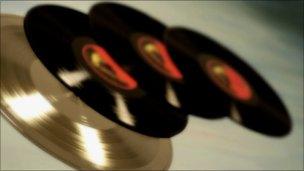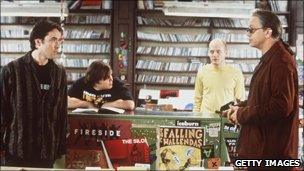How record shops changed my life
- Published
- comments

The news that HMV is the latest music retailer in trouble may not upset the downloaders. But for many, like this self-confessed music obsessive, record shops were always more than just a place to buy the latest album.
Madonna lived in Luton. I would see her on Saturday afternoons in the Arndale Centre huddled silently together with the members of Mr Mister, Midnight Star and Mike and the Mechanics.
I spent much of my teenage years with Madonna and visited her often at her alphabetically arranged home in the HMV record store in Luton.
I grew up in a town where there was little to do and nowhere to go; where the only culture I was likely to see was at the bottom of a rancid pot of yoghurt.
If you grow up in a town like that the most precious places were those that offered a window into other worlds - places like the cinema, the library and the record store. For me the HMV store wasn't just a place to buy music; walking into it felt a bit like slipping through the back of a wardrobe into Narnia.
It was rare not to spend at least some of every Saturday at the record store, it was where I got to hang out with all my favourite bands and rock stars and where I would eventually buy the albums that would finally let me break out from my home town.
It is not yet known if the Luton branch of HMV will be one of the 60 shops that is set to close, but as someone who spent much of my life browsing and buying music in record stores I do know that there is something about visiting a real shop that cannot be replicated in the digital world.
Obsession
My teenage years were in a time before mobile phones and the internet. The record store was our social network site: it was where the different tribes of music fans - those who shook their hair to metal and those who gyrated to dance and those who nodded thoughtfully to acoustic folk- could all meet. In my family I was unusual in being obsessed by music and thinking that it literally could change my life.
When I went to the record store I would see others for whom music mattered as much as it did for me. The sheer quantity of what was available was dizzying; it is true that today there is even more available online but it is not the same as seeing rows and rows of albums, all neatly organised by genre and alphabet. To walk into the record store was to plunge myself into a sea of music.
Music had always been important in my life but it was only when a friend introduced me to the music of Bruce Springsteen that I realised that music could also change a life. As I later described in my memoir Greetings from Bury Park, the music of Springsteen offered me a route-map of how to get out of my unfulfilling existence in Luton and it gave me the confidence to believe I could forge a better life.
It was in my local HMV store that I bought the Springsteen albums that changed my life. In those days before internet leaks we would actually be excited prior to an album's official release date. I remember taking an early bus into town and rushing to the record store to get the new Springsteen album and peeling back the cover and devouring the lyrics as I walked through the mall, my eyes fixed on the vinyl and crashing into whoever was in my path.
When I left Luton to study at Manchester University during the late 80s I ditched HMV in favour of second-hand record stores such as Vinyl Exchange where I would happily browse for hours in the company of fellow music obsessives. In these stores I quickly learnt how private musical passions could easily be made public .
The Billy Joel fan clutching his copy of River of Dreams would find himself in front of the Stone Roses fan and looks would be exchanged. Browsing through the racks of records there was a delicious delight in finally locating an album that you had long sought. There is a sad irony that today nothing is especially hard to find and so nothing is especially rare.
I am now in the last six months of my 30s and I still enjoy visiting record stores. But with the news of the closure of 60 HMV shops, how much longer will music fans be able to visit actual stores?
Music = distraction
It is easy to get misty-eyed about the past, and there are undoubted benefits in the emergence of the internet and digital music players. I don't miss taking bundles of CDs on holiday only to find them unplayable after being scratched by sand.

The film High Fidelity romanticised the record shop
Thanks to digital music players such as the iPod I can carry more music around than was ever possible in the past and because of sites such as YouTube and Spotify, I can listen to albums without paying.
And whereas in the past it was possible to think you were the only person in the world who loved your favourite band today, thanks to social networking, you can find others like you around the world.
The advantages are substantial but it is not only nostalgia that leads me to mourn the passing of record stores. The sad truth seems be that while there is now more music available than ever its value to us has diminished.
We listen to it on the same machines that we use to surf, tweet, call and text; music is just another form of distraction and these days we prefer our gratification without delays.
If and when record stores do disappear, our lives and our culture will be diminished because they are a tangible reminder of when music offered more than virtual pleasures.
Sarfraz Manzoor is a writer for the Guardian and the author of the memoir Greetings from Bury Park: race, religion, rock 'n' roll. You can follow him on Twitter at www.twitter.com/sarfrazmanzoor, external